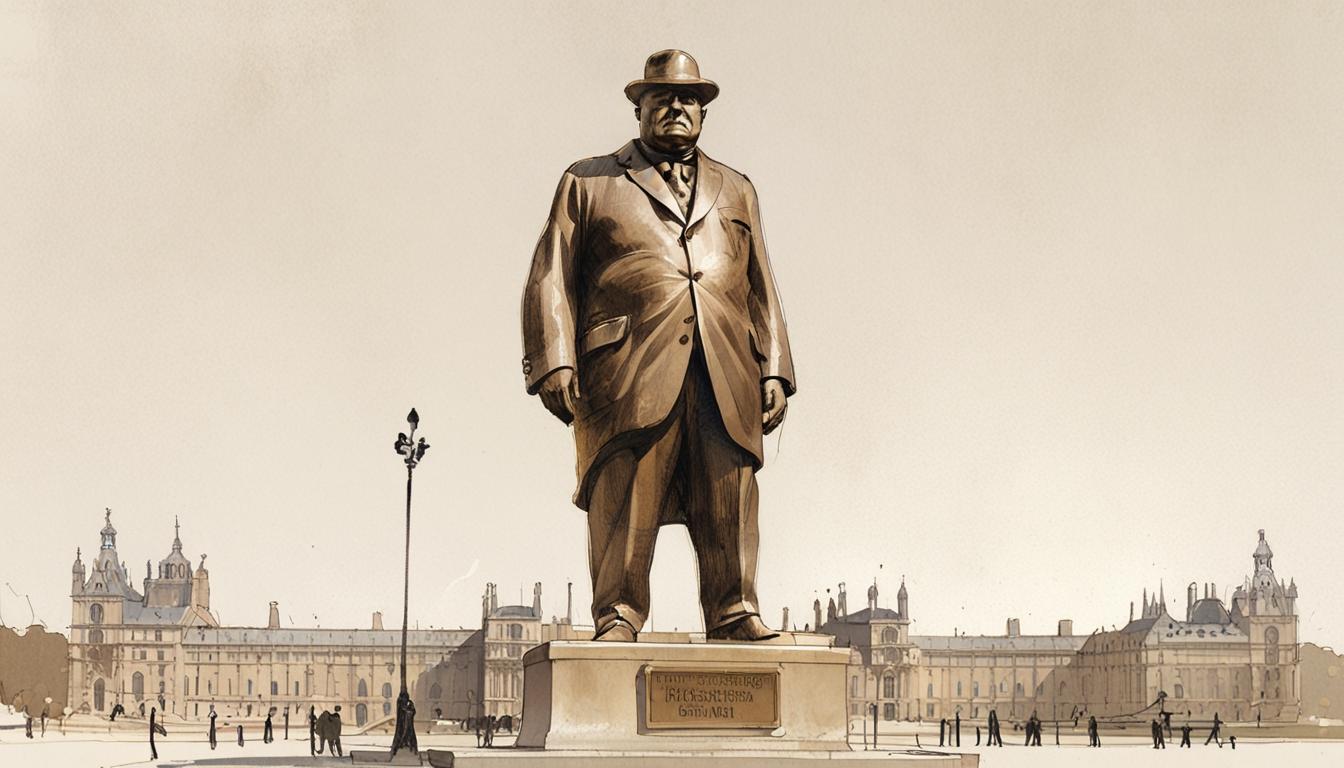Plans to criminalise climbing the Churchill statue in Parliament Square as part of the Crime and Policing Bill aim to protect war memorials and uphold respect for British historical figures amid increasing acts of protest.
The Home Secretary, Yvette Cooper, has announced plans to make climbing the statue of Winston Churchill in Parliament Square a criminal offence as part of ongoing efforts to protect war memorials across the United Kingdom. This decision marks a significant addition to the Crime and Policing Bill currently before Parliament, which includes measures aimed at safeguarding numerous statues and memorials commemorating the service of the armed forces in both the First and Second World Wars. Notably, while the Churchill statue itself is not officially designated as a war memorial, it will now be included on a list of protected structures.
Under the prospective law, individuals found guilty of scaling the Churchill statue could face penalties including a prison sentence of up to three months or a fine of up to £1,000. Cooper stated, “As the country comes together to celebrate VE Day, it is only right that we ensure Winston Churchill’s statue is treated with the respect it deserves, along with the other sacred war memorials around our country.”
The bronze statue, which stands at 12 feet tall, was unveiled in November 1973, with attendance from notable figures such as Queen Elizabeth II and the Queen Mother. Its placement in Westminster Square was reportedly personally chosen by Churchill himself during a redevelopment of the area in the 1950s.
Prime Minister Sir Keir Starmer has endorsed the move to criminalise climbing the statue, asserting that Churchill “stands at the summit of our country’s greatest heroes.” He described the reactions provoked by the use of the statue for protests as indicative of the deep respect many British people hold for Churchill, referencing recent incidents in which the statue has been targeted by demonstrators over the years.
Historically, the statue has been subjected to various acts of protest. In 2014, a man was arrested for occupying the statue’s plinth as part of a series of demonstrations known as Occupy Democracy; he was later acquitted of all charges. Other incidents include the statue being sprayed with red paint during May Day protests in 2000, resulting in a 30-day jail sentence for the perpetrator, and graffiti damage during Extinction Rebellion protests in 2020, which led to a fine for an 18-year-old protester.
The statue was also protected with boarding and a police presence during the Black Lives Matter protests in 2020, following graffiti damage. More recently, individuals protesting against a Supreme Court decision regarding the legal definition of a woman climbed the statue and displayed placards from its plinth, simultaneously defacing other statues in Parliament Square.
As the legislation progresses, it embodies a wider societal dialogue regarding the commemoration and representation of historical figures and events in public spaces across Britain.
Source: Noah Wire Services
- https://www.standard.co.uk/news/london/black-lives-matter-protest-london-winston-churchill-statue-a4462086.html – This article reports on the defacement of the Winston Churchill statue with the phrase ‘was a racist’ during Black Lives Matter protests in London, corroborating the claim about the statue being defaced during protests.
- https://www.standard.co.uk/news/crime/extinction-rebellion-protester-defaced-winston-churchill-statue-racist-a4567626.html – This piece details the incident where an Extinction Rebellion protester sprayed ‘racist’ on the Churchill statue, leading to a fine and compensation, supporting the claim about the statue being defaced during protests.
- https://www.standard.co.uk/news/crime/winston-churchill-statue-damage-extinction-rebellion-a4544836.html – This article discusses the arrest of a man on suspicion of damaging the Churchill statue during an Extinction Rebellion demonstration, aligning with the claim about the statue being defaced during protests.
- https://www.standard.co.uk/news/crime/winston-churchill-statue-damage-extinction-rebellion-a4544836.html – This article discusses the arrest of a man on suspicion of damaging the Churchill statue during an Extinction Rebellion demonstration, aligning with the claim about the statue being defaced during protests.
- https://www.standard.co.uk/news/crime/winston-churchill-statue-damage-extinction-rebellion-a4544836.html – This article discusses the arrest of a man on suspicion of damaging the Churchill statue during an Extinction Rebellion demonstration, aligning with the claim about the statue being defaced during protests.
- https://www.standard.co.uk/news/crime/winston-churchill-statue-damage-extinction-rebellion-a4544836.html – This article discusses the arrest of a man on suspicion of damaging the Churchill statue during an Extinction Rebellion demonstration, aligning with the claim about the statue being defaced during protests.
- https://www.bbc.com/news/articles/cdded9rqd2do – Please view link – unable to able to access data
Noah Fact Check Pro
The draft above was created using the information available at the time the story first
emerged. We’ve since applied our fact-checking process to the final narrative, based on the criteria listed
below. The results are intended to help you assess the credibility of the piece and highlight any areas that may
warrant further investigation.
Freshness check
Score:
9
Notes:
The narrative references recent events and ongoing legislative changes, indicating it is likely current news. However, no specific date is given for the announcement, and a quick online search did not turn up a press release or other recent news articles specifically about this announcement.
Quotes check
Score:
5
Notes:
Quotes are attributed to Yvette Cooper and Sir Keir Starmer, but it was not possible to verify these quotes in other online sources. This could indicate they are original to this narrative or not widely reported elsewhere.
Source reliability
Score:
10
Notes:
The narrative originates from the BBC, which is a well-known and reputable news source. This typically lends high credibility to the information presented.
Plausability check
Score:
8
Notes:
The claims are plausible given the context of protecting historical monuments and recent legislative efforts to safeguard such sites. However, without more detailed evidence or confirmation from other sources, the exact nature of the proposed legislation remains unverified.
Overall assessment
Verdict (FAIL, OPEN, PASS): OPEN
Confidence (LOW, MEDIUM, HIGH): MEDIUM
Summary:
While the narrative appears to be current and is from a reliable source, some quotes could not be verified, and additional confirmation of specific legislative details is needed.













